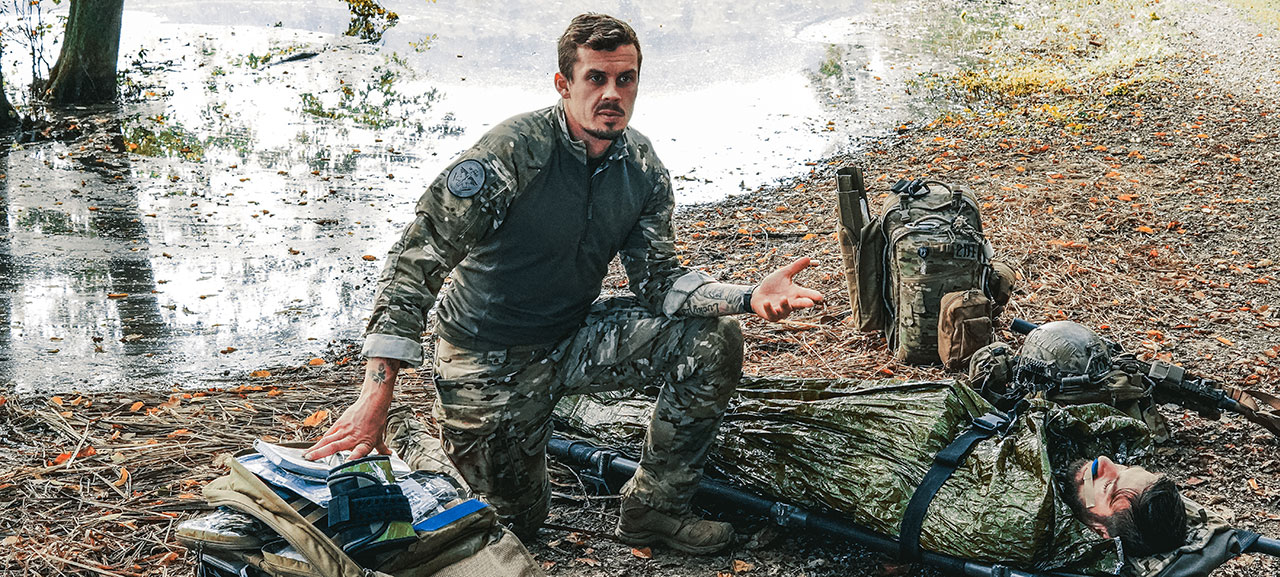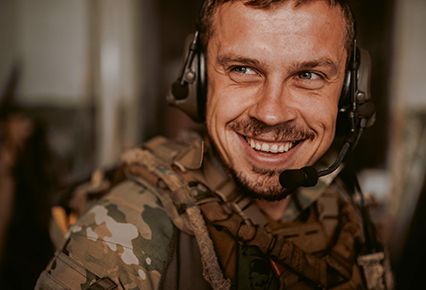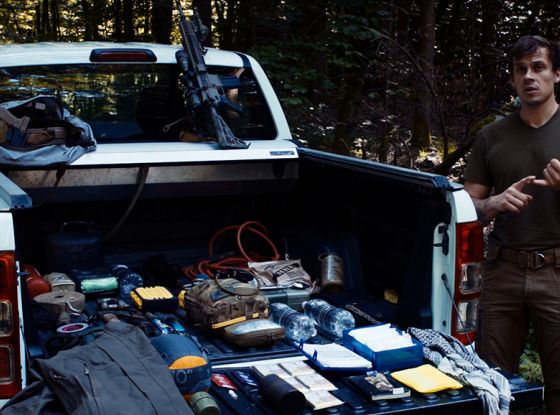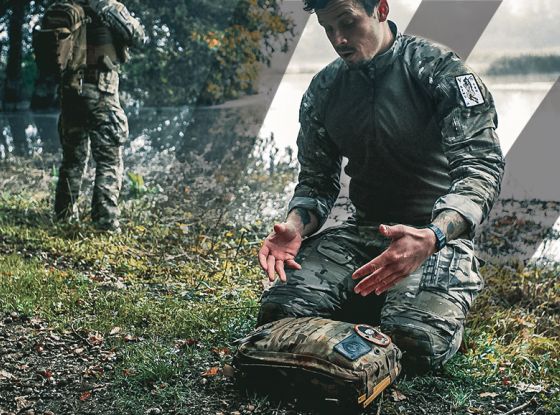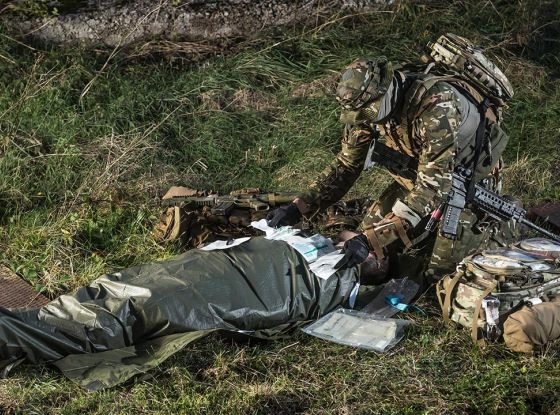There are 10 essentials for prolonged field care success; knowing them can help combat medics make better decisions about what equipment and supplies to carry with them.
In this blog post:
Before Preparing Your Prolonged Field Care Bag
A lot of people go bonkers when it comes to prolonged field care bag prep. They think they have to fill the bag with everything and the kitchen sink.
I don’t fault them for that. But the better way is to carry only what you know how to use (or that you at least have a sense of how to use, so that maybe someone doing telemedicine can walk you through while you’re treating the casualty). There’s just no point in loading your bag with sexy stuff if you lack the ability to use any of it.
Still, whatever you decide to carry, you have to make sure you’re hitting the essentials for prolonged field care success. There are 10 of these essentials, and I’ll tell you about them now.
10 Essentials for Prolonged Field Care Success
1. Patient monitoring capability
At a bare minimum, you should carry a blood-pressure cuff, stethoscope, pulse oximeter, and the good old Foley catheter. You earn bonus points for also having capnometry capability.
These items give you the means to capture the patient’s vitals, but you also need to record and then interpret them. Luckily, these days everything is printed/plasticized on a sheet of paper.
Equipment:
- Stethoscope
- Blood pressure cuff
- Pulse oximeter
- Foley catheter
2. Resuscitation capability
Here, I’m talking about resuscitation capability that’s beyond crystalloid/colloid infusion.To put a checkmark next to this block you need to be in possession of a field-fresh, whole-blood transfusion kit.
Fluid warmer, lactated ringers/hypertonic saline fluids for major burns and/or closed-head injuries, and anything else you might press into service should be considered a plus. Even better would be a stock of PRBCs, FFP, and already known type‐specific donors for immediate FWB draws.
Equipment:
- Field blood transfusion kit
- Quantum fluid warmer
3. Ventilation/oxygenation capability
PEEP via BVM is your first line of defence. After that, it’s a portable ventilator with supplemental O2 (delivered via an oxygen concentrator because, well, the last thing you’ll want is to be in a firefight while crouched next to an O2 tank—hot lead penetrates that canister and, kaboom, you’ll be trading your prolonged field care kit for a harp and a set of wings).
Equipment:
- Portable ventilator and supplemental O2
4. Airway control
To achieve airway control, you’ll use an inflated cuff inserted into the trachea. But, first, you need to administer ketamine cricothyrotomy (ketamine, because you don’t want to go all medieval on the patient and attempt to shove the cuff down his throat dry).
It might be that you aren’t into slashing necks open. If that’s the case for you, then think about having an RSI capability (my thoughts run first to knowledge, equipment, and skill, with drugs coming in last).
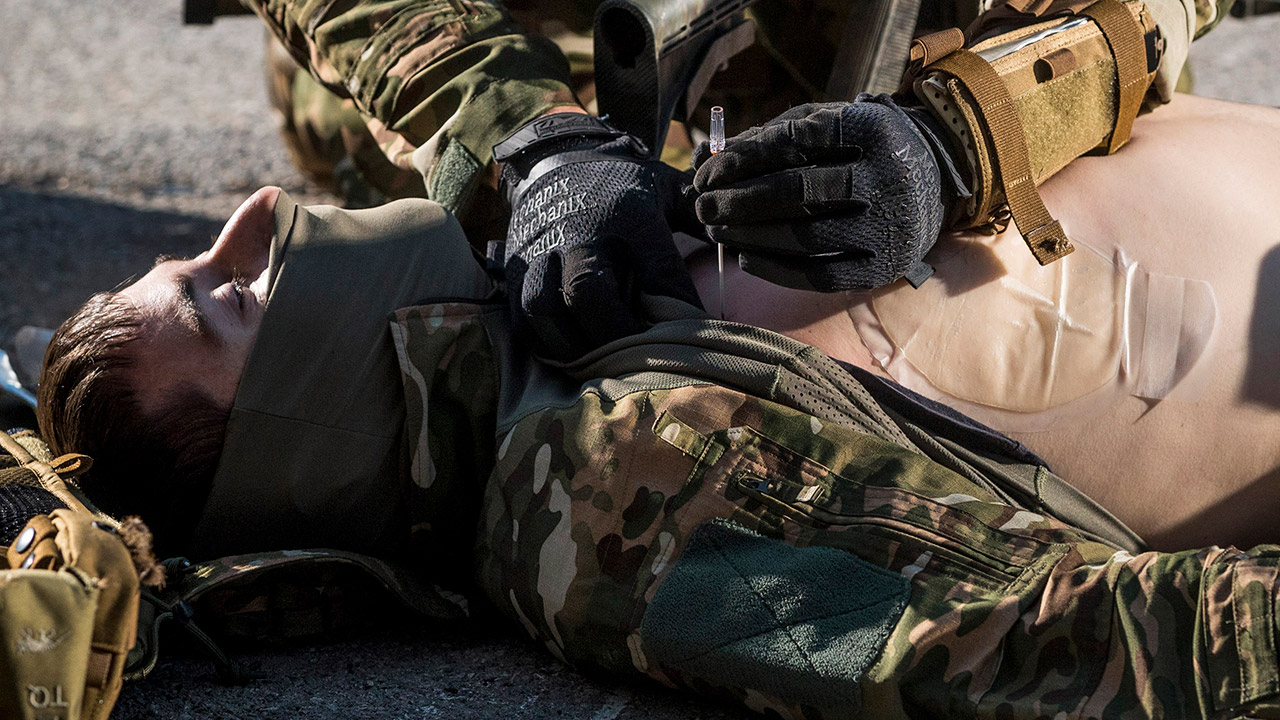
Get more intel on how to perform an NDC here.
5. Sedation/pain control
Adequate sedation and/or pain control comes from all the fun stuff that “my friend” is always talking about: opiates, ketamine (with midazolam), and Fentanyl.
Given that prolonged field care can translate into “long prison time”, it’s vital that you know lasting sedation techniques and be able to administer these drugs safely.
A word to the wise: you’ll find that your drugs quickly become depleted if you administer them via an IV without titration—and they deplete even faster if administered intramuscularly.
Things:
- Pain control
- Adequate sedation
6. Bullshite detection capability
Everybody lies, so don’t blindly believe what your patient tells you. That’s one reason to periodically conduct physical exams and diagnostic measurements—it’s to see problems your patient doesn’t recognize or that he knows about but isn’t acknowledging.
Ultrasound shows what’s going on in real-time inside the body, but it’s only useful if you know what you’re looking at. Among the things you’re looking for in an ultrasound are signs of blood accumulation (remember to do ultrasounds periodically so that you don’t acquire and rely on a false negative).
Urine dipsticks are another good detection tool. They’re not too expensive to obtain, so think of them as the poor man's laboratory.
7. Nurse-like thinking
Prolonged field care isn’t Pew Pew magic—it’s a superpower called nursing. Therefore, you should strive to think like a nurse.
The role of a nurse is to make sure the patient is clean, pink, warm, dry, and comfortable. You need to do likewise.
For example, provide your patient bed padding so he doesn’t develop pressure sores. Also, provide basic wound care (for this, I carry a “hygiene bag” containing stuff taken from my bathroom). And be sure to exhibit some nurse-level bedside manners instead of making like you’re the sharp-tongued Dr. House.
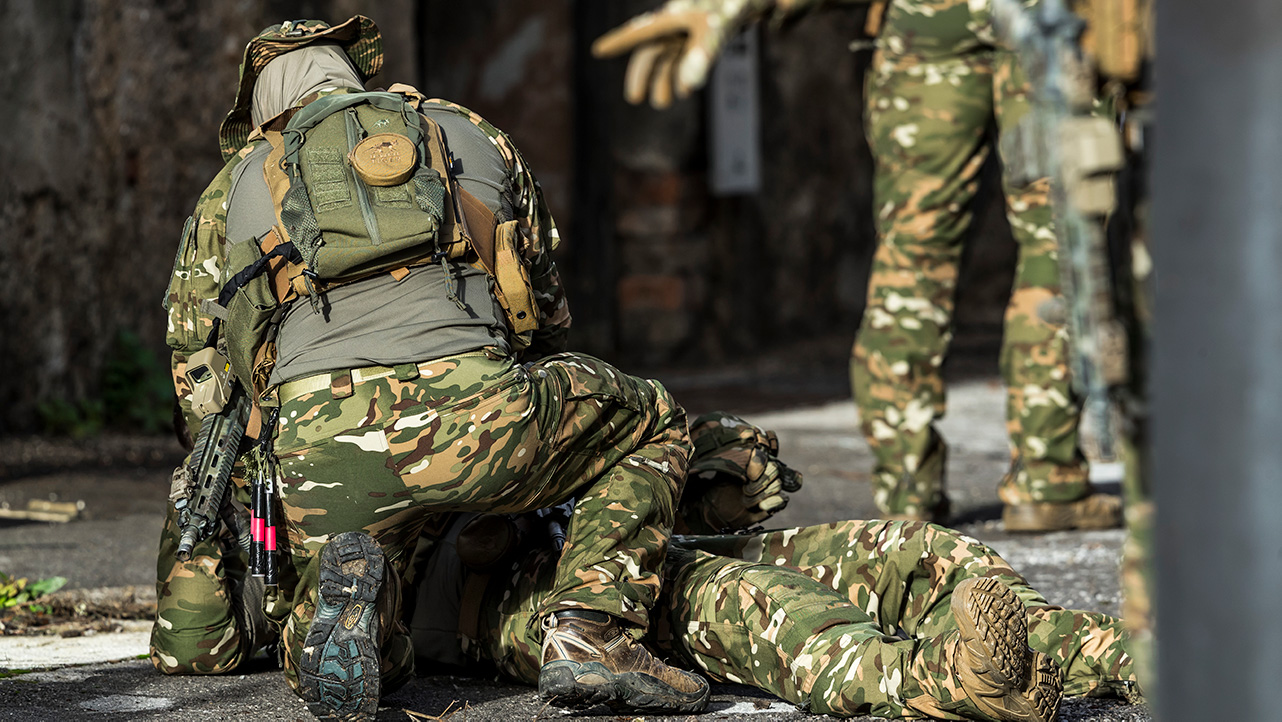
8. Surgical capability
Know how to safely apply a scalpel to the patient’s flesh and to sutre him up. This is your money maker for trauma. Accordingly, carry with you a chest tube kit, Cric kit, and a surgical kit. No one expects you to be able to perform brain surgery on the guy, but you should at least have it within you to do escharotomies, wound debridements, amputations, and anything else that might be needed to save the patient’s life.
Equipment:
- Chest tube kit
- Cric kit
- Surgical kit
9. Good communications
This capability won’t rest on your shoulders. It’ll be on those of your team’s Echo/communications guy (assuming you have one or that he’s not the patient).
If you have a good comms guy, he’ll be able to call out to the people with all the medical brains and set you up for a telemedicine consult (be sure to have a cheat sheet handy so the doc you’re talking to won’t end up thinking you’re a mouth-breather and instead will actually have faith in you).
Find out from your Echo if he has the ability to send out diagnostic images and lab results to the big brains; if he does possess that capability, that will give you a significant advantage.
10. Knowledge
Maybe luck will be smiling on you and the patient, and his EVAC will arrive in a hurry. And maybe the patient will make it in one piece to a higher level of care.
But if the EVAC isn’t going to show up for a long time, you’ll be the one having to possibly provide that higher level of care. For that responsibility, you’ll need to rely on the most important item in your capabilities toolbox—knowledge.
It’s for this reason that you need to be familiar with and trained in critical care and transport. You might be able to improvise with telemedicine, but this is the real world and you have to be equipped to succeed in it.
Equipment:
- Knowledge
And one final tip: you can use a prolonged field care bag as a resupply point, taking equipment and supplies from it to replenish a smaller bag that you’ve depleted. Your prolonged field care bag probably isn’t something you’ll have to hump a long way—usually, it will be driven to wherever you’re going. So, don’t hesitate to resupply that smaller bag. Like the Boy Scouts motto says, “always be prepared.”
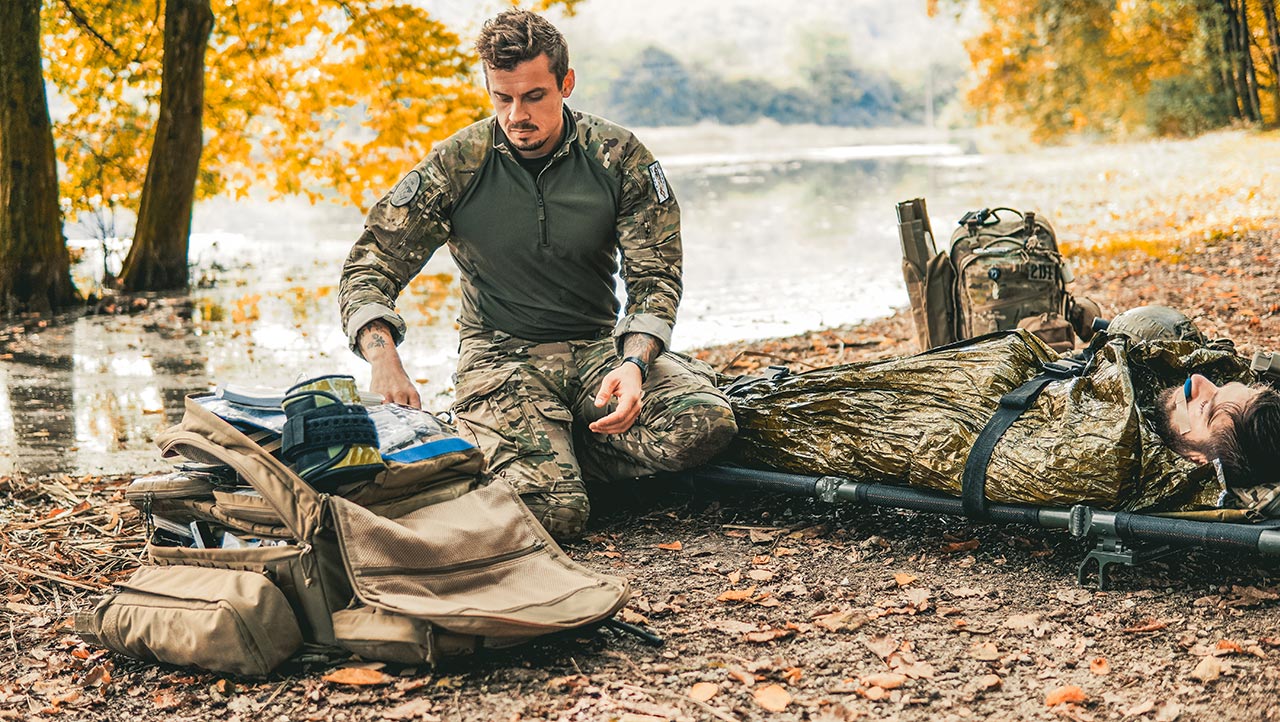
Recap
Ideally, you should carry one prolonged field care bag per team. But the ideal isn’t always possible, so be ready to improvise if you can. Spread among all your vehicles the various types of aid bags you’ll be bringing (the prolonged field care bag, 24-hour bag, direct-action bag; if you have extra supplies, you can also make a dedicated “mass call” bag).
On the matter of resupply, you can increase your success by staging different bags with your resupply guys. That way, you can have access to the extra gear prepared in advance.
Keep in mind that you’re going to be using medical equipment while everything is flying left and right around you.
With that in mind, let me offer this word of wisdom from Buffalo Soldiers: “Cleanliness is next to godliness.” Pick up everything behind you; leave nothing for the enemy. And when the bird comes, have a hat and some eypro for our casualties.

